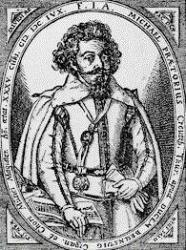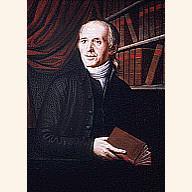Planning worship?
Check out our sister site, ZeteoSearch.org,
for 20+ additional resources related to your search.
- |
User Links
Person Results
‹ Return to hymnal


Export as CSV
Benjamin Praetorius

1636 - 1674 Hymnal Number: d212 Author of "Sei getreu bis an das Ende, das nicht Marter" in Neue Sammlung von Psalmen, Lobgesaengen und Geistlichen Liedern ... der Alten Brueder ... Prätorius, Benjamin, son of Andreas Prätorius, pastor at Obergreieslau near Weissenfels in Saxony, was born at Obergreisslau, January 1, 1636. In 1637. his father was appointed pastor at Gross-Lissa near Delitzsch, in Saxony. Benjamin became a student of theology, and giaduated M.A., probably at Leipzig. In the entry of his marriage in the registers of Gross-Lista, for 1657, he is described as "regularly ordained substitute and future successor of this parish": and he is never described in the registers except as Pastor-substitute. His ninth child was born in 1671, and on Jan. 8, 1675, his son Andreas Benjamin, on acting as godfather, is described as “surviving son" of M. Benjamin Prätorius. It is probable that he died some time in 1674, but as the register of deaths of this period is lost, we are unable to fix the exact date (K. Goedeke's Grundriss, vol. iii., 1887, p. 176; manuscript from Pastor Moebius of Gross-Lissa, &c).
According to Wetzel, ii., 314, he was crowned as a poet on Feb. 15, 1661. In the registers for 1663 he first designs himself "poëta Caes." and "Kais. gekrönter Poëta" (i.e. imperial crowned poet), and in 1670 as "poëta Caes. laur. coronatus." His hymns appeared in his (1) Jauchtzendes Libanon, Leipzig, 1659, and (2) Spielende Myrten-Aue, Leipzig, 1663. In the preface to the latter he signs himself as "C. P. Caes. und Diener am Wort daselbst" (minister of the Word), under date “Gross-Lissa, Dec. 24, 1663."
The only hymn by him translated into English is:—
Sei getreu bis an das Ende. The Reward of the Faithful. In 1659, as above, No. 64, p. 15?, in 9 stanzas of 8 lines, and founded on Rev. ii. 10. In full in the Unverfälschter Liedersegen, 1851, No. 339. It is also often found as "Sei getreu in deinem Leiden," as in the Berlin Geistliche Lieder, ed. 1863, No. 749. This is from Luppius' sGesang-Buch, Wesel, 1692, p. 22, where it is in 7 stanzas (iv., ii., iii., v., ix., i. and a new stanza which begins, "So wohlan, so will ich leiden"), and is erroneously ascribed to J. C. Schade. The original form is tr. as:—
Be thou faithful to the end, Let not. By Miss Warner, in her Hymns of the Church Militant, 1858, p. 362, repeated as No. 255, in Bishop Ryle's Collection, 1860. [Rev. James Mearns, M.A.]
--John Julian, Dictionary of Hymnology (1907)
Benjamin Praetorius
Ambrose Lobwasser
1515 - 1585 Person Name: Ambrosius Lobwasser Hymnal Number: d116 Author of "Ihr Knecht' des Herren allzugleich, den Herren" in Neue Sammlung von Psalmen, Lobgesaengen und Geistlichen Liedern ... der Alten Brueder ... Lobwasser, Ambrosius, son of Fabian Lobwasser, inspector of mines at Schneeberg, Saxony, was born at Schneeberg, April 4, 1515. After studying law at Leipzig (M.A. 1535) he remained there as University tutor until 1550. After acting as travelling tutor, he was appointed in 1557 Rath and Chancellor at Meissen, and in 1562 made a tour in Italy, and received the degree of LL.D. from the University of Bologna. He was finally appointed in 1563 by Duke Albrecht of Prussia as professor of law and assessor at the High Court of Justice at Königsberg. He died at Königsberg Nov. 27, 1585 (Koch, ii. 394-401, &c).
His principal poetical work was his version of the Psalter. One has passed into English in recent times, viz:
Ihr Knecht des Herren all zugleich. [Ps. cxxxiv.] The original is Beza's version of the Psalm, "Or sus, serviteurs de Seigneur," which first appeared in his Trente-quatre pseaumes de David, Geneva, 1551. Lobwasser's version is in his Psalter dess Königlichen Propheten Dauids, Leipzig, 1573 (not paged), in 3 st. of 4 1., entitled “He encourages the people to fulfil their calling diligently, and assures them that God will grant them His grace." Translated as :—
Ye servants of the Lord, who stand. In full, by Miss Winkworth, as No. 88 in her Chorale Book for England, 1863, and set to the original melody of 1551. [Rev. James Mearns, M.A.]
--John Julian, Dictionary of Hymnology (1907)
Ambrose Lobwasser
Justus Henry Christian Helmuth

1745 - 1825 Person Name: Justus H. C. Helmuth Hymnal Number: d202 Author of "Pr'chtig kommt der Herr, mein Koenig" in Neue Sammlung von Psalmen, Lobgesaengen und Geistlichen Liedern ... der Alten Brueder ...
Justus Henry Christian Helmuth
Johann Friedrich Möckel
1661 - 1729 Person Name: Johann Friedrich Moeckel Hymnal Number: d188 Author of "Nun sich die nacht geendet hat" in Neue Sammlung von Psalmen, Lobgesaengen und Geistlichen Liedern ... der Alten Brueder ...
Johann Friedrich Möckel
Johann Nass
Hymnal Number: d51 Author of "Eins betruebt mich sehr auf Erden" in Neue Sammlung von Psalmen, Lobgesaengen und Geistlichen Liedern ... der Alten Brueder ...
Johann Nass
Wilhelm Preiss
Hymnal Number: d242 Author of "Was ich euch nun sage hier" in Neue Sammlung von Psalmen, Lobgesaengen und Geistlichen Liedern ... der Alten Brueder ...
Wilhelm Preiss
Lucas Bacmeister
1578 - 1638 Person Name: Lucas Backmeister Hymnal Number: d129 Author of "Jesu, meiner Seelen Ruh" in Neue Sammlung von Psalmen, Lobgesaengen und Geistlichen Liedern ... der Alten Brueder ...
Lucas Bacmeister
Johannes Walter
1781 - 1818 Hymnal Number: d150 Author of "Kommt, Brueder, [Schwestern] kommt, wir eilen fort" in Neue Sammlung von Psalmen, Lobgesaengen und Geistlichen Liedern ... der Alten Brueder ... Walter, Johannes. (Berks Co., Pennsylvania, August 21, 1781--December 3, 1818). Evangelical. Was early assistant to Albright, founder of denomination, first as tile-make, later as companion on preaching trips. Editor of the first Evanglical hymnbook, Eine kleine Sammlung Alter und Neuer Geistricher Lider (1810), containing 56 hymns of which he wrote several. The most famous of his hymns, "Kommt brüder, kommt, wir eilen fort" was recited to a companion while traveling a winter circuit, hurriedly written out on arrival, and published as a broadside. It and another of his hymns, "Wer will mit uns nach Zion gehn?" were the two most popular German hymns written in America. They are found in the most popular of the Evangelical hymnbooks, the "Viole," and were sung by German Methodists in the Midwest and in Germany and Switzerland. An English version of the former, "Come, brothers, come, why longer wait?" was also widely sung.
--Ellen Jane Lorenz, DNAH Archives
Johannes Walter
Valentin Ernst Löscher
1673 - 1749 Person Name: Valentin Ernst Loescher Hymnal Number: d55 Author of "Erhebe dich, mein froher Mund" in Neue Sammlung von Psalmen, Lobgesaengen und Geistlichen Liedern ... der Alten Brueder ...
Valentin Ernst Löscher
Alexander Mack
1712 - 1803 Hymnal Number: d181 Author of "Nun bricht der huetten haus entzwey" in Neue Sammlung von Psalmen, Lobgesaengen und Geistlichen Liedern ... der Alten Brueder ... Alexander Mack was born in Germany in 1712 the son of Alexander Mack 1679-1735, the founder of the Church of the Brethren in Schwarzenau, Wittgenstein. Due to religious persecution, his early life was spent in West Friesland in the Netherlands. His family came to the United States when he was 17 and settled in Germantown, Pennsylvania. After his father died, Mack, in 1737 joined with Stephen Koch, a member of the church, in retreat for a time of meditation and prayer in a house along the Wissahckon. Mack later joined the Ephrata Society, but left Ephrata around 1746 and returned to the Church of the Brethren and served as minister, elder, and bishop. He wrote hymns as well as prose and also letters to a large number of people.
Dianne Shapiro from The Religious Poetry of Alexander Mack, Jr. by Samuel B. Heckman (Elgin, IL: Brethren Publishing House, 1912)
Alexander Mack


 My Starred Hymns
My Starred Hymns


